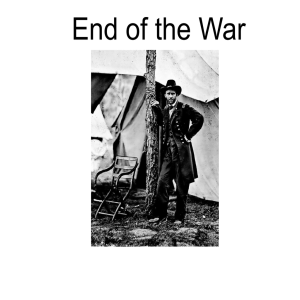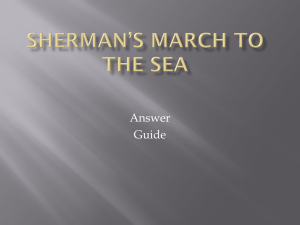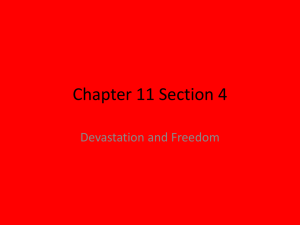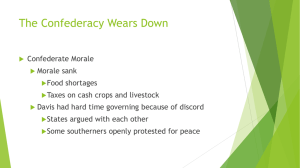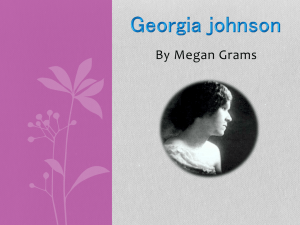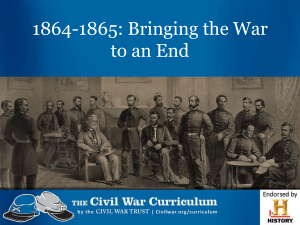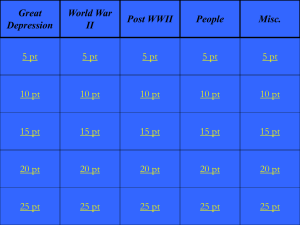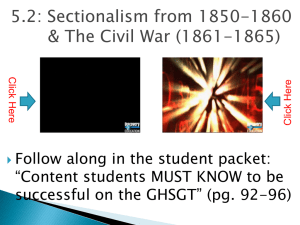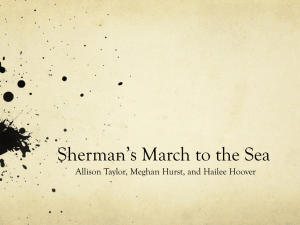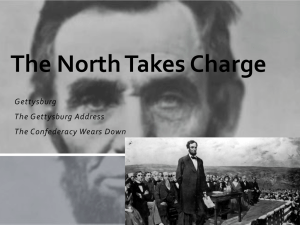The American Civil War
advertisement
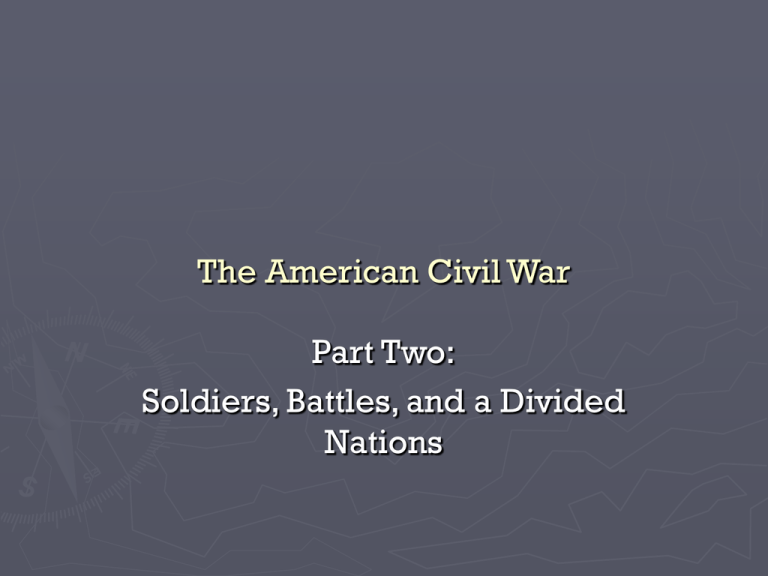
The American Civil War Part Two: Soldiers, Battles, and a Divided Nations GPS SS8H6b We will state the importance of key events of the Civil War to include Antietam, Emancipation Proclamation, Gettysburg, Chickamauga, the Union blockade of Georgia's coast, Sherman’s Atlanta Campaign, Sherman’s March to the Sea, and Andersonville. How did the Union and the Confederacy Compare with each other? Strengths of each side UNION ► Superior number of population, factories, manufacturing weapons, railroads, etc. ► Out produce in food crops ► Controlled 80% of bank money ► Organized military and technology CONFEDERACY 1. Best Generals (Lee and Jackson) 2. Soldiers more experienced with outdoors, guns, and horses 3. Fighting to protect their homes 4. Patriotic spirit and confidence Georgia in 1861 a. Agriculture: By 1860 there were 68,000 farms in GA. Produced 700,000 bales of cotton in 1860. Only 3,500 farms (5%) were of 500 acres or more. b. Slavery: 460,000 slaves (4 million in South total) Only 236 Georgians owned more than 100 slaves and 60 percent had no slaves at all. Over half of the wealth of Georgia ($400 million) was in the value of slaves as property c. Railroads: 1,226 miles of railroads Main lines were Savannah to Macon to Atlanta; Montgomery, AL to Atlanta to Augusta; Chattanooga to Atlanta 1840s Atlanta first called Terminus (end of line Chattanooga to Chattahoochee River) Confederate Railroads Map Search 1-Battle of Antietam; 2-Battle of Gettysburg; 3-Battle of Chickamauga; 4-Atlanta Campaign; 5-Andersonville; 6Sherman’s March to the Sea; 7-Battle of Shiloh 8-Seige of Vicksburg; 9-Battle of Chancellorsville 10-Richmond (Capital of Confederacy) 11-Washington D.C. (Capital of Union) 12-Milledgville (Capital of Georgia) ^-^-^-^-^--Union Blockade of the South +++++++Major Railroads of Georgia Military Objectives in 1861 UNION 1. Preserve the Union 2. “Anaconda Plan” a. Divide the Confederacy in two via the Mississippi River b. Capture Richmond c. Capture important transportation centers (Atlanta) and ports d. Union Blockade (nothing coming in or out) CONFEDERACY 1. Maintain Independence!!! 2. Offensive Defense 3. “Cotton Diplomacy” Hope European powers will: a. Break the Northern blockade b. Join the side of the South against the North 4. Test Northern public opinion’s will to fight Daily Lives of Civilians and Soldiers during the Civil War (SS8H6b) 1. How were the daily lives of Southerners affected by the Union Blockade? They couldn’t import sugar and coffee. Cotton and tobacco couldn’t be shipped out. Limited amount of meat. Do to limited supply of food prices rose dramatically ex. Salt used to be one cent a pound before war now it is fifty cents, flour 200 dollars a barrel also shoes were a hundred dollars a pair. People resorted to using curtains and carpets to make clothes used animal skins for shoes Limited med supply confederate soldiers had to do without guns and uniforms people had very little wood or coal to heat their homes 2. Nickname for a Union soldier was Billy Yank, and the nickname for a Confederate soldier was Johnny Rebel. 3. What were the average daily rations for a Union soldier? 20 oz. of beef, 18 of flour, 2.5 of dried beans, 1.6 of coffee, 2.4 of sugar,.64 of salt What rations for a Confederate soldier? And why who they have very little? 1.4lbs of bacon 18oz. of flour 10lbs of rice small amount of dried beans and fruit 4. The color of the Union uniforms was blue and the typical Confederate soldier wore grey colored uniforms. 5. What items would a Civil War carry in their knapsacks and belts? Paper to write letters home, pictures, book, utensils and a cup, sewing kit Cap box, rolled up blanket 6. What types of activities would Civil War soldiers engage in when not in battle? Play jokes on each other, write letters, read letters, play games such as chess, checkers, gambling, wood carving, prayer and camp meetings The Emancipation Proclamation ► Issued by Abraham Lincoln on September 22, 1862 ► Battle of Antietam was the victory Lincoln needed to make the proclamation public ► Changed the focus of the war from just “preserving the Union” to Freeing men from slavery!!! **Freed slaves only in areas that were in rebellion against United States Lincoln’s reasons for the Emancipation Proclamation Military A. Incentive to stop rebellion B. Use freedmen as soldiers C. Demoralize Confederate leaders and soldiers 1. Diplomatically A. Convince Great Britain and France from joining on side of Confederacy (or) B. Recognizing southern independence 2. Lincoln’s reasons for the Emancipation Proclamation C. Morally 1. Bring the nation in line with the principle in the Declaration of Independence that “all men are created equal” 2. Raised the perception of war from political to moral : not just preserving the Union BUT making men free!! 3. Speed up the inevitable—slavery will end someday, so why not NOW!! 4. Lincoln’s own personal convictions What did it say? “That on the 1st day of January, A.D. 1863, all persons held as slaves within any State or designated part of a State the people whereof shall then be in rebellion against the United States shall then, thenceforward, and forever free. . .” Or in today’s language –if you are still fighting against the United Sates, you lose your slaves!!!! 1. Slaves would be freed in the states of: Arkansas, Texas, Mississippi, Alabama, Florida, Georgia, South Carolina, and North Carolina 2. Slaves will only be freed in certain part of the states of Louisiana (southern part and New Orleans) and Virginia (western Virginia and by Norfolk) 3. Slavery will remain in the border states of Missouri, Kentucky, Maryland, Delaware, and Tennessee African-American Soldiers 1. How many African-Americans fought in the Civil War? 2. What did the 54th Massachusetts felt they had to prove during the war? 3. What famous battle did they prove themselves as soldiers? 4. Which black soldier won the Congressional Medal of Honor? 5. What was the most honored position within an army unit during the Civil War? (Information was from Georgia Stories Video Series) Animated maps of the Battle of Chickamauga Civil War in Georgia: 1863 Battle of Chickamauga (September 19-20) ► ► ► ► ► ► Union western forces planned to secure important railroad center of Chattanooga, TN. To do so, move to defeat Confederates at Chickamauga Creek in northern Georgia. Confederates, lead by General Braxton Bragg, defeats Union army. Retreat back to Chattanooga and Confederates trap them. Bragg, however, fails to follow up and attack. Another victory would have turned the war in the favor of the South (lost at Gettysburg and Vicksburg two months before) General U.S. Grant takes over for Union, and defeats Bragg’s army in November 1863. Chickamauga seen as “The Last hurrah of the South!” Civil War In Georgia: 1864 Atlanta Campaign (May to September 1864) Three Contest in 1864 which will decide the War #1 Battles in Virginia U.S. Grant (Lt. General of the Army of the Potomac) Robert E. Lee (General of the Army of Northern Virginia) Three Contests in 1864 which will decide the War #2 Battles in Georgia ► General William T. Sherman (112, 000 soldiers) ► General Joseph E. Johnston (60,000 soldiers) Three Contest in 1864 which will decide the War #3 Election of 1864 Abraham Lincoln (Republican Party) Running for re-election Emancipation Proclamation General George B. McClellan (Northern Democrats or “Copperheads” who opposed the won) Fired by Lincoln twice In Spring of 1864, Grant’s and Sherman’s armies move to defeat the southern armies. Grant’s objective was to defeat Robert E. Lee and capture Richmond Sherman’s objective was to defeat Johnston’s army in Georgia and capture the industrial and railroad center of Atlanta. Abraham Lincoln was running for re-election and needed one of the two southern armies defeated, and Richmond or Atlanta captured. Why? Ex-General George McClellan and Copperheads were feeding off the Northern citizens who were becoming tried of the war!! (Too many killed; Is the Union worth it?) By July 1864 the fate of the Union looked bad!! WHY?? Lee and Grant fought to a tie, and both armies entrenched around St. Petersburg and Richmond, VA Northern public perceived Grant as a “butcher” by sacrificing too many soldiers Robert E. Lee is “unstoppable” and cannot be defeated!! ► In Georgia, Sherman’s and Johnston’s armies fight to a stalemate outside of Atlanta. ► Although outnumbered and out gunned, a. Johnston plays a defensive campaign and refuses to attack b. Forces Sherman to attack and lose men (such as, Kennesaw Mountain where 3,000 died or wounded) c. Burns bridges and blocks roads to slow Sherman’s advance towards Atlanta ► As a result, the Northern public perceives Lincoln’s war strategies as a failure ► The cities of Atlanta and Richmond can never be captured ► The war is going “NO WHERE!!” ► Copperheads and Democrats promise an end to the war, allow the Confederacy their independence, and void the Emancipation Proclamation if McClellan is elected as President to replace Lincoln!!! ► So all the Confederacy has to do is to hold onto their positions and maintain the stalemates outside of Atlanta and Richmond until November’s 1864 Presidential election. BUT—did that happen? NO!! Someone changed all that!! Ironically, the Confederacy’s own President, Jefferson Davis fires Johnston as commander of the southern troops in Georgia Why? 1. Wanted a General who attacked 2. Personality conflict with Johnston Now What? ► ► ► ► ► John Bell Hood, new commander of southern army in GA, leads series of “foolish” and overconfident attack on Sherman’s in July and August 1864. Over 12,000 irreplaceable troops are lost, and eventually had to leave Atlanta on September 1st!! The Consequences Lincoln gets his victory and is re-elected (The war will go on.) South loses an important transportation and industrial center (Cannot supply Lee’s troops in Virginia) Opens the door for Sherman to wage Total War in Georgia Georgia Stories: Battle of Jonesboro Sherman’s March to the Sea: A Tragic Example of Total War In November 15, 1864, General Sherman started out to capture Savannah, GA. He also wanted to wage “total war” on the South (military and civilians). Why? a. Break down what economic and transportation resources the South still had. b. Punish the South for leaving the Union c. Break the spirit of its people and bring war to a quick end. Breaking off all communication with Washington, Sherman lead 65,000 Union troops on a path of destruction on innocent citizens For five weeks, Sherman’s army burnt farms, plantation homes, and confiscated most food supplies. Describe this picture. Who is involved? And what are they doing? His troops left “Sherman sentinels” which were burnt homes with only the chimneys standing They also left “Sherman neckties” which were rails torn up, heated and then wrapped around trees Oh God, the time of trial has come!“ Personal Account of Sherman’s March Dolly Sumner Lunt was born in Maine in 1817. She moved to Georgia as a young woman to join her married sister. She became a school teacher in Covington, Ga. where she met and married Thomas Burge, a plantation owner.When her husband died in 1858, Dolly was left alone to manage the plantation and its slaves. Dolly kept a diary of her experiences and we join her story as Sherman's army approaches her home: November 19, 1864 Slept in my clothes last night, as I heard that the Yankees went to neighbor Montgomery's on Thursday night at one o'clock, searched his house, drank his wine, and took his money and valuables. As we were not disturbed, I walked after breakfast, with Sadai [the narrator's 9-year-old daughter], up to Mr. Joe Perry's, my nearest neighbor, where the Yankees were yesterday. Saw Mrs. Laura [Perry] in the road surrounded by her children, seeming to be looking for some one. She said she was looking for her husband, that old Mrs. Perry had just sent her word that the Yankees went to James Perry's the night before, plundered his house, and drove off all his stock, and that she must drive hers into the old fields. Before we were done talking, up came Joe and Jim Perry from their hiding-place. Jim was very much excited. Happening to turn and look behind, as we stood there, I saw some blue-coats coming down the hill. Jim immediately raised his gun, swearing he would kill them anyhow. 'No, don't!' said I, and ran home as fast as I could, with Sadai. I could hear them cry, 'Halt! Halt!' and their guns went off in quick succession. Oh God, the time of trial has come! A man passed on his way to Covington. I halloed to him, asking him if he did not know the Yankees were coming. 'No - are they?' 'Yes,' said I; 'they are not three hundred yards from here.' 'Sure enough,' said he. 'Well, I'll not go. I don't want them to get my horse.' And although within hearing of their guns, he would stop and look for them. Blissful ignorance! Not knowing, not hearing, he has not suffered the suspense, the fear, that I have for the past forty-eight hours. I walked to the gate. There they came filing up. I hastened back to my frightened servants and told them that they had better hide, and then went back to the gate to claim protection and a guard. But like demons they rush in! My yards are full. To my smoke-house, my dairy, pantry, kitchen, and cellar, like famished wolves they come, breaking locks and whatever is in their way. The thousand pounds of meat in my smokehouse is gone in a twinkling, my flour, my meat, my lard, butter, eggs, pickles of various kinds - both in vinegar and brine - wine, jars, and jugs are all gone. My eighteen fat turkeys, my hens, chickens, and fowls, my young pigs, are shot down in my yard and hunted as if they were rebels themselves. Utterly powerless I ran out and appealed to the guard. 'I cannot help you, Madam; it is orders.' ...Alas! little did I think while trying to save my house from plunder and fire that they were forcing my boys [slaves] from home at the point of the bayonet. One, Newton, jumped into bed in his cabin, and declared himself sick. Another crawled under the floor, - a lame boy he was, - but they pulled him out, placed him on a horse, and drove him off. Mid, poor Mid! The last I saw of him, a man had him going around the garden, looking, as I thought, for my sheep, as he was my shepherd. Jack came crying to me, the big tears coursing down his cheeks, saying they were making him go. I said: 'Stay in my room.' But a man followed in, cursing him and threatening to shoot him if he did not go; so poor Jack had to yield. ... Sherman himself and a greater portion of his army passed my house that day. All day, as the sad moments rolled on, were they passing not only in front of my house, but from behind; they tore down my garden palings, made a road through my back-yard and lot field, driving their stock and riding through, tearing down my fences and desolating my home - wantonly doing it when there was no necessity for it. ...As night drew its sable curtains around us, the heavens from every point were lit up with flames from burning buildings. Dinnerless and supperless as we were, it was nothing in comparison with the fear of being driven out homeless to the dreary woods. Nothing to eat! I could give my guard no supper, so he left us. My Heavenly Father alone saved me from the destructive fire. My carriage-house had in it eight bales of cotton, with my carriage, buggy, and harness. On top of the cotton were some carded cotton rolls, a hundred pounds or more. These were thrown out of the blanket in which they were, and a large twist of the rolls taken and set on fire, and thrown into the boat of my carriage, which was close up to the cotton bales. Thanks to my God, the cotton only burned over, and then went out. Shall I ever forget the deliverance? November 20, 1864. About ten o'clock they had all passed save one, who came in and wanted coffee made, which was done, and he, too, went on. A few minutes elapsed, and two couriers riding rapidly passed back. Then, presently, more soldiers came by, and this ended the passing of Sherman's army by my place, leaving me poorer by thirty thousand dollars than I was yesterday morning. And a much stronger Rebel!" Andersonville How many soldiers were imprisoned at Andersonville prison? What did prisoners used for shelters? What were the men called who stole from other prisoners? What did the small stream in the middle of Andersonville prison double as? 5. How many men died at Andersonville? (Information from Georgia Stories Video Series)
